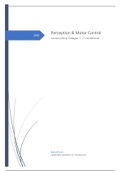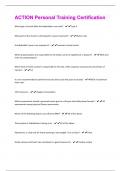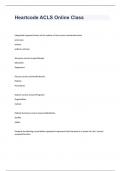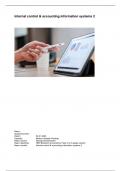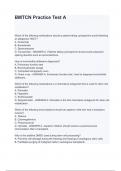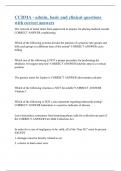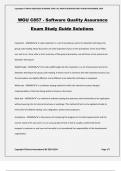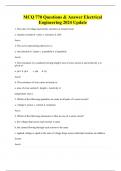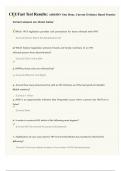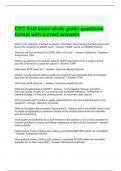Perception & Motor Control
Samenvatting Colleges 1 – 7, Nederlands
BakedToast
EINDHOVEN UNIVERSITY OF TECHNOLOGY
, ~ Lecture 1 ~
Aristotle’s five classical senses:
• See (vision)
• Hear (audition)
• Feel (touch)
• Taste (gustation)
• Smell (olfaction)
Other human senses include: Non-human senses
• pain (nociception) o Electric fields (fish)
• balance (vestibular system) o Magnetic fields (pigeons)
• body posture (proprioception) o Light polarisation (insects)
• temperature
• internal organs
o respiration, heart beating
o hunger, gagging, swallowing
o full bladder, rectum
General physiological principles:
Transduction: gespecialiseerde cellen in de sense
organs zetten stimulusenergie om in elektrische
signalen.
Verschillende ervaringen worden opgeroepen
(evoked) omdat de signalen van verschillende
zintuigen in verschillende hersenengebieden
aankomen (specifieke zenuwenergie).
Elektrische stimulatie in deze gebieden roept een
overeenkomstige sensatie op.
Classification of the senses:
De belangrijkste zintuigen kunnen worden onderverdeeld in vier receptortypes en zes ontvangende
hersengebieden:
Sense Stimulus Receptor Sensory Cortex
structure
Vision Elektromagnetic Photoreceptors Eye Primary visual cortex
energy
Hearing Air pressure waves Mechanoreceptors Ear Auditory cortex
Touch Tissue distortion Mechanoreceptors, Vestibular Temporal cortex
thermoreceptors organs
Balance Gravity, acceleration Mechanoreceptors Vestibular Temporal cortex
organs
Taste/smell Chemical composition Chemoreceptors Nose, Primary taste cortex,
mouth olfactory cortex
,Sensations & Representation
Magnitude of sensations:
Sensations worden veroorzaakt door stimulatie van de sensorische organen. Meestal, hoe intenser de
stimulus, hoe sterker het gevoel. Light intensity → brightness. De mate van toename varieert met
verschillende sensaties. De wet van Steven: relatie is een machtswet.
Adaptation – aanpassing -:
De relatie tussen sensory magnitude en stimulus level staat niet vast,
maar varieert afhankelijk van de stimulus conditions. Na langdurige
blootstelling aan een bepaald stimulus level wordt de schijnbare
intensiteit verminderd en zijn zwakke stimuli moeilijker te detecteren:
adaptation.
Representation:
We hebben gezien dat sensorische stimulatie gelokaliseerde
activiteit veroorzaakt in specifieke sensorische hersengebieden
(localization of function). Verschillende patterns of brain activity
representeren verschillende sensaties.
Maar sensaties = / = neurale activiteit.
▪ Een sensatie (gevoel) is een bewuste mentale
toestand (conscious mental state).
▪ Neural activity is een fysieke toestand.
Het verbinden van sensaties met neurale activiteit vereist een
theorie: linking propositions. Een verbindende propositie
verbindt mentale toestanden met fysieke toestanden.
Perceptuele verwerking gaat door opeenvolgende fasen.
Elke fase computes een representation van de input.
Points to remember:
• Sensaties komen overeen met patronen van brain activity in specifieke brain areas (localization
of function)
• Sensaties worden veroorzaakt door stimulatie van sensorische receptorcellen in onze sensorische
organen (transductie)
• Sensaties hebben vaak een magnitude
• Na verloop van tijd neemt de waargenomen (sensed) magnitude af (adaptation)
• Elektrische signalen van de sensorische receptoren worden in verschillende stages verwerkt
(processed) (computation)
• Elke stage ‘representeert’ de externe oorzaak van de stimulatie (representation)
, Nervous system:
Het zenuwstelsel is niet alleen het brein, maar ook the spinal cord en nerve fibers (of alleen nerves).
Information processing neemt al plaats in het nervous system. De basic functional unit van het systeem is
de neuron. Mensen hebben ongeveer 20 miljars neuronen in de hersenen, in vergelijking met de octopus
met 300 miljoen en een bij met 950 duizend.
Directions in the brain
Rostral Toward the nose
Caudal Toward the tail
Dorsal Toward the back
Ventral Toward the belly
Lateral Toward the side
Medial Toward the middle
Anatomic organization of the brain:
Anatomically: Brodmann’s areas.
Functional organization of the brain
De functionele organisatie van de hersenen is ook topografisch.
Hersengebieden zijn gespecialiseerd voor bepaalde functions.
Neurons – Terms.
Er zijn veel verschillende soorten neuronen. Unipolar cell,
bipolar cell, pseudo-unipolar cell and three types of
multipolar cells (motor neuron, pyramidal cell of
hippocampus, pikinje cell of cerebellum).
Dendrites: Ontvangen neurotransmitters uit andere cellen.
Het geleidt signalen naar de triggerzone (meestal in de buurt
van het cellicaam).
Trigger zone (cell body): Integreert elektrische signal en ‘vuurt’ een actiepotentiaal.
Axon: Geleidt elektrische signalen naar de terminal buttons (aansluitknoppen).
Axon-terminals (synapsen): Geeft neurotransmitters vrij. Ze zijn verbonden met dendrieten van andere
neuronen.
Myelineschede: Voor verbetering van de geleiding (conduction)
Nodes of ranview: Vergroot actiepotentiaal
Sensory neuron:
Transduction van fysieke naar elektrische signalen. Als ze een drempel (threshold) overschrijven, vuurt het
neuron een actiepotentiaal (of spike -piek-). Hoe sterker het signaal → hoe sneller het neuron vuurt.
Langere duurt van het signaal → hoe langer het neuron vuurt.


